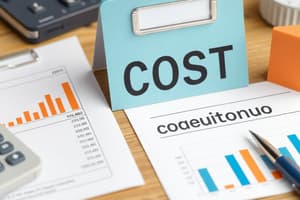Podcast
Questions and Answers
Cost accounting is a branch of accounting that focuses on capturing, analyzing, and reporting ______ associated with the production of goods or services.
Cost accounting is a branch of accounting that focuses on capturing, analyzing, and reporting ______ associated with the production of goods or services.
costs
Direct costs can be attributed to a specific ______ such as raw materials and labor.
Direct costs can be attributed to a specific ______ such as raw materials and labor.
product
Fixed costs are expenses that remain constant regardless of ______ levels.
Fixed costs are expenses that remain constant regardless of ______ levels.
production
Break-even analysis determines the sales volume at which total revenues equal total ______.
Break-even analysis determines the sales volume at which total revenues equal total ______.
Activity-Based Costing (ABC) allocates overhead costs based on ______ that drive costs.
Activity-Based Costing (ABC) allocates overhead costs based on ______ that drive costs.
Variance analysis compares budgeted costs to ______ costs to identify discrepancies.
Variance analysis compares budgeted costs to ______ costs to identify discrepancies.
Marginal costing examines the impact of producing one ______ unit on overall costs.
Marginal costing examines the impact of producing one ______ unit on overall costs.
Cost accounting enhances pricing strategies and profitability ______.
Cost accounting enhances pricing strategies and profitability ______.
Flashcards are hidden until you start studying
Study Notes
Cost Accounting
-
Definition: Cost accounting is a branch of accounting that focuses on capturing, analyzing, and reporting costs associated with the production of goods or services.
-
Purpose:
- Helps businesses understand their costs and pricing strategies.
- Aids in budgeting, financial planning, and cost control.
- Assists in decision-making regarding resource allocation and operational efficiency.
-
Key Components:
- Direct Costs: Costs that can be directly attributed to a specific product (e.g., raw materials, labor).
- Indirect Costs: Costs that are not directly traceable to a product (e.g., utilities, rent).
- Fixed Costs: Costs that remain constant regardless of production levels (e.g., salaries, lease payments).
- Variable Costs: Costs that vary with production volume (e.g., materials, commissions).
-
Costing Methods:
- Job Order Costing: Costs are assigned to specific jobs or batches; suitable for custom products.
- Process Costing: Costs are averaged over large volumes of identical products; used in mass production.
- Activity-Based Costing (ABC): Allocates overhead costs based on activities that drive costs, providing more precise cost information.
-
Cost Analysis:
- Break-even Analysis: Determines the sales volume at which total revenues equal total costs, indicating no profit or loss.
- Marginal Costing: Examines the impact of producing one additional unit on overall costs.
- Variance Analysis: Compares budgeted costs to actual costs to identify discrepancies and areas for improvement.
-
Reporting:
- Cost Reports: Provide detailed insights into cost behavior and efficiency.
- Budget Reports: Compare budgeted versus actual performance to manage financial health.
-
Benefits:
- Improves cost control and operational efficiency.
- Enhances pricing strategies and profitability analysis.
- Supports strategic planning and financial decision-making.
-
Limitations:
- May involve complex calculations and assumptions.
- Requires accurate data input; errors can lead to misleading conclusions.
- Focuses primarily on internal processes, which might neglect external market factors.
Cost Accounting Overview
- A branch of accounting focused on capturing, analyzing, and reporting production costs for goods and services.
- Essential for understanding costs and shaping pricing strategies.
Purpose of Cost Accounting
- Facilitates budgeting and financial planning, aiding in managing business resources.
- Assists in cost control measures to enhance operational efficiency.
- Supports informed decision-making about resource allocation.
Key Components of Cost Accounting
- Direct Costs: Directly attributed to a specific product, including raw materials and labor.
- Indirect Costs: Not directly traceable to a product, such as utilities and rent.
- Fixed Costs: Remain constant regardless of production level, e.g., fixed salaries and lease payments.
- Variable Costs: Fluctuate with production volume, such as materials and sales commissions.
Costing Methods
- Job Order Costing: Assigns costs to specific jobs or batches, suitable for custom or made-to-order products.
- Process Costing: Averages costs over large quantities of identical items, typical in mass production environments.
- Activity-Based Costing (ABC): Allocates overhead costs based on the activities driving these costs, offering more precise information on expenses.
Cost Analysis Techniques
- Break-even Analysis: Identifies the sales volume necessary for total revenues to equal total costs, resulting in neither profit nor loss.
- Marginal Costing: Assesses the financial impact of producing one additional unit on total costs.
- Variance Analysis: Compares budgeted costs with actual expenditures to identify discrepancies and areas needing improvement.
Reporting in Cost Accounting
- Cost Reports: Deliver detailed insights into cost behavior and operational efficiency.
- Budget Reports: Compare financial performance against budgeted figures to manage overall financial health.
Benefits of Cost Accounting
- Enhances cost control measures and promotes operational efficiency.
- Provides insights for effective pricing strategies and profitability analysis.
- Supports strategic planning and informed financial decision-making.
Limitations of Cost Accounting
- Can involve intricate calculations and inherent assumptions.
- Requires precise data input; inaccuracies may lead to misleading conclusions.
- Primarily focused on internal processes, potentially overlooking broader market conditions.
Studying That Suits You
Use AI to generate personalized quizzes and flashcards to suit your learning preferences.




